 Source: bing.com
Source: bing.comAs a parent, you want to do everything you can to help your baby grow and develop. By the time your baby reaches 7 months old, they have already made significant progress in their physical, cognitive, and social-emotional development. However, there are still many things you can do to support their continued growth and development. In this article, we will discuss some helpful tips on how to help your baby development at 7 months old.
Table of Contents
Physical Development
At 7 months old, your baby is likely sitting up on their own and may even be crawling. To support their physical development, you can encourage them to continue practicing these skills. You can also provide them with toys and objects that encourage them to reach and grasp, such as soft blocks or rattles. Tummy time is also an essential activity that helps your baby develop strength in their core and upper body. Make sure to supervise your baby during tummy time and provide plenty of interesting toys to keep them engaged.
Cognitive Development
Your 7-month-old baby is beginning to understand cause and effect relationships, such as the fact that pressing a button on a toy makes it light up or play music. You can support their cognitive development by providing them with toys and activities that allow them to explore and experiment with cause and effect. For example, you could give them a set of stacking cups or a shape sorter toy. Reading to your baby is also an excellent way to promote cognitive development and encourages a love of learning from a young age.
Social-Emotional Development
At 7 months old, your baby is learning to express their emotions and respond to the emotions of others. You can support their social-emotional development by providing them with plenty of opportunities to interact with people they know and trust, such as family members and close friends. Talk to your baby often, and respond to their coos and babbling. This will help them learn that communication is a two-way street and that their actions have an impact on those around them.
Nutrition
At 7 months old, your baby is likely starting to eat solid foods in addition to breast milk or formula. It’s essential to provide your baby with a variety of healthy foods to support their growth and development. Offer them a mix of fruits, vegetables, and proteins and be patient as they learn to eat. It’s normal for babies to reject new foods at first, so don’t get discouraged. Keep offering a variety of healthy options, and eventually, they will learn to enjoy them.
Sleep
Sleep is crucial for your baby’s growth and development. At 7 months old, your baby may be sleeping through the night, but they may also experience sleep disruptions due to teething or developmental milestones. Stick to a consistent bedtime routine and create a calm, soothing environment for your baby to sleep in. If your baby does wake up during the night, try to comfort them without stimulating them too much, and avoid turning on bright lights or playing with toys.
Conclusion
By following these tips, you can help support your baby’s growth and development at 7 months old. Remember to be patient and enjoy this exciting time in your baby’s life.
Frequently Asked Questions
Q: How can I encourage my baby to crawl?
A: You can encourage your baby to crawl by placing toys just out of their reach or by placing them on their tummy and gently encouraging them to move forward.
Q: How much sleep should my 7-month-old baby be getting?
A: Your 7-month-old baby should be getting around 14-15 hours of sleep per day, including naps.
Q: When should I start introducing solid foods to my baby?
A: Most babies are ready to start trying solid foods between 4 and 6 months old, but it’s always best to consult with your pediatrician first.
Q: How can I tell if my baby is getting enough to eat?
A: You can tell if your baby is getting enough to eat by monitoring their weight gain, the number of wet diapers they have, and if they seem content after feeding.
Q: How can I help my baby learn to talk?
A: You can help your baby learn to talk by talking to them often, responding to their coos and babbling, and reading to them daily.
